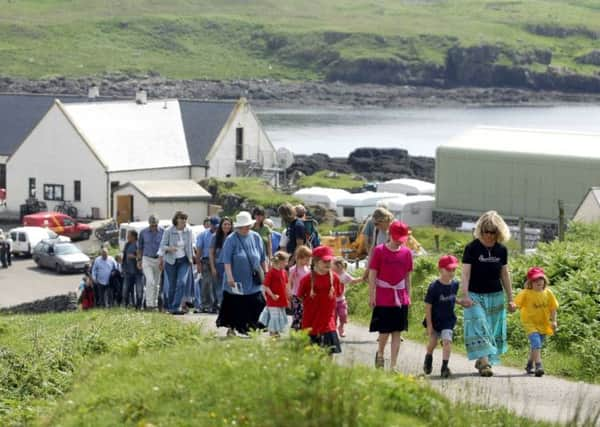Book review: Owning the Earth by Andro Linklater


OWNING THE EARTH
ANDRO LINKLATER
Bloomsbuey, 496pp, £20
Last October Andro Linklater suffered a heart attack while visiting the island of Eigg. He died a week later in Edinburgh.
The youngest of the remarkable children of the Welsh-Orcadian author Eric Linklater, Andro’s own writing was as varied and colourful as his much-travelled life. After producing children’s literature and biography, a decade ago he tackled the Land Question in Measuring America, a detailed account of how the New World was carved up and sold.
Advertisement
Hide AdIn Eigg on that fatal October day he was exploring a way to bring that concern closer to home. Seventeen years ago, Eigg became the first Scottish island estate in modern times to transfer from private to community ownership. It was therefore a key stepping stone on Linklater’s path towards a new book on land ownership in the Hebrides.
Regretfully, that book will not be written. The compensation is that before his death Andro Linklater had already finished and delivered a comprehensive account of global land ownership. Owning the Earth is a suitable memorial to an extraordinary intellect.
Even for a polymath like Linklater, this was an audacious undertaking. Its brief was nothing short of the story of how almost the whole of this planet has become, in various cultures and polities, different forms of property. The result is a sprawling, sparkling, off-the-wall political history of the globe.
His thesis is straightforward – that the capital value of productive land was a recent revelation. Before the Middle Ages in western Europe, or the 18th and 19th centuries in the East, in America and Australasia, land was either feudal or communal.
Feudalism, in Linklater’s engagingly contrarian account, has been almost deliberately misunderstood and misrepresented by a modern world which is anxious to stress its own advances. Feudalism was responsible for the age-old ubiquity of the peasantry – “for most of history, most people have viewed their past and their futures as peasants.”
Feudal superiors knouted serfs and raped servants every hour on the hour, but in the grand scheme it was a stable and effective form of land ownership, which is why feudalism endured for so long not only in Europe but also in China, India, Latin America, and much of the Middle East.
Advertisement
Hide AdFeudalism enabled governments to use landlords as tax-collecting and law-enforcing middlemen. Landlords in their turn made a good living from such administration, which hardly counted as work. The work was left to the peasants, who at least had land without needing money to buy it.
Then along came the western Enlightenment and the realisation (which Linklater credits first to an English surveyor called William Petty) that land was a commodity and was open to investment and improvement. Both peasants and lazy landlords had to make way for capitalist farmers, international conglomerates and in large parts of central Europe and Asia, state-owned agricultural enterprises. Beyond, in the vast, unconquered tribal lands of North America and Australia, were people who considered themselves to be as free to hunt, gather, kill and die as any other carnivorous mammal. Their nemesis arrived on the wagon trains and sailing ships carrying men with muskets and surveyors’ chains.
Advertisement
Hide AdA central theme of Linklater’s narrative is that since the dismantling of feudalism and the colonisation of continents thinly populated by itinerant tribes, we have struggled to find adequate and acceptable alternatives.
The voracity of capitalism has not only dispossessed millions of people; it has also degraded much of the earth. Communist state farms in the Soviet Union and China were not always as unproductive as they were rumoured to be, but in most cases they proved to be both humanly and ecologically unsustainable.
That conundrum is not new. Linklater takes us back 350 years to Thomas Hobbes. Writing as the western land revolution was gathering pace, Hobbes wrestled, in Linklater’s succinct paraphrase, with the observation that “the one force greater than the individual’s greed to acquire more of everything was the individual’s fear of being destroyed by the violence of everyone else’s greed.” In short, sensible public regulation of such essential assets as land was not only desirable but should also be voluntary.
We might say, tell that to the Dukes of Roxburghe and Westminster. Luckily, those eminences and their peers no longer have a monopoly on landholding.Linklater believed that the Hobbesian formula has been, to a degree, justified. “The guardian of the public interest,” he concludes, “... grows from humanity’s simultaneous desire for individual fulfilment and for social justice.”
He will have observed the fruits of such apparently contradictory ambitions in the community-owned island of Eigg. Had he been spared, he could even now be studying this in another 300,000 acres of democratic, locally-controlled Hebridean estate land.
We will never know in detail what Linklater thought of the recent community land acquisitions in the north-west of Scotland. His last book suggests that he would have acknowledged this experiment with collectivisation in a capitalist society as yet another small, brave attempt to resolve an issue which continues to trouble the whole of humanity.